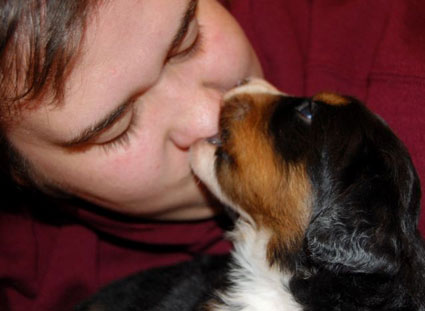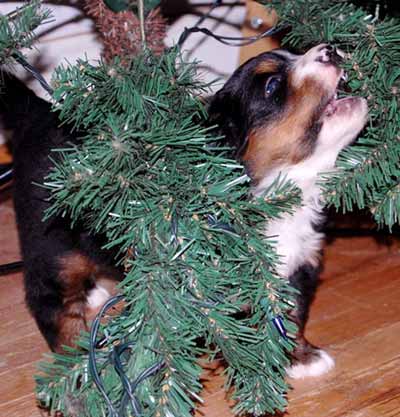Litter Life
The First Eight Weeks ? The Life and Times of Bouncing, Biting, Baby Berners
By Mary-Ann Bowman, Ph.D.
Fourth Week
The fourth week puppies are getting teeth ? first the top ones arrive and then the bottom ones follow. Their jaw strength is not initially hard enough to hurt as they bite, but that comes quickly. This is an important time for a puppy to learn bite inhibition. In other words, we let the puppies bite, but communicate when the biting is too hard, so the puppies learn to have a soft mouth and are not frustrated by constant reprimands to stop doing something they developmentally need to do. (For an excellent discussion of bite inhibition, see http://www.siriuspup.com/pdfs/04Chewing.pdf).
Fig. 8: Interaction with People

Fourth-week puppies are very playful and waddle over to the edge of the pen or whelping box when they see a person or another dog. When a person sits in the puppy area, the puppies toddle over and climb in a lap (see Fig. 8: Interaction with People). They play with each other, people and toys with increasing frequency as the week passes. They are not yet hurting each other, but that comes quickly with all those sharp new teeth.

Fourth-week puppies are curious and watch what happens on the other side of their pen. They are awake more but still spend most of their days sleeping. Puppies at this age are also thoughtfully considering whether it is time to start scampering. You can see it in their faces and how they kind of coil up their chubby little bodies but then realize they do not quite have the coordination yet and abandon the idea. However, it won't be long before the scampering begins!
By the end of the fourth week, the puppies' eyes are darkening from the dark blue color they start with, and they are also getting fluffy! Puppies of this age are able to start understanding a designated potty area and will use it maybe 25% of the time; this will quickly increase over the next week. The puppies carry toys around, seek out each other and people for interactions and play, and really look like small dogs by the end of four weeks. They change each day, becoming more coordinated and engaged with their world.